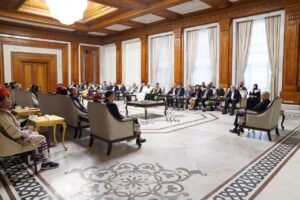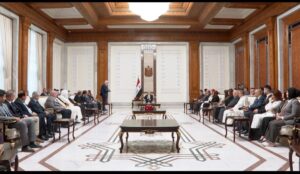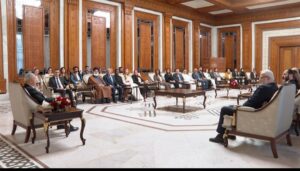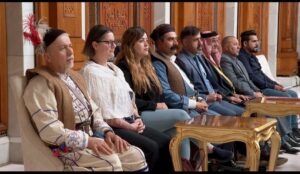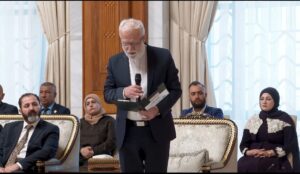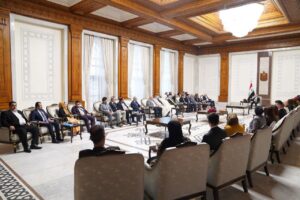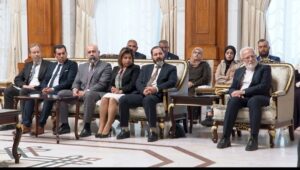His Excellency the President of Iraq, Dr. Abdullatif Rashid, received on Tuesday, 7th March 2023, at Baghdad Palace, an expanded delegation of participants in the “National Day for Tolerance” program, which, the program, was prepared and organized by (CAPNI for Humanitarian Aid) and (UFUQ for Human Development) in coordination with the (National Security Advisory) and with the support of (World Council of Churches WCC) and (Norwegian Church Aid NCA).
The delegation included directors and representatives of the aforementioned entities, representatives of religious and societal references from the Sabean-Mandaeans, Yazidis, Kakai and Zoroastrians, and intellectual and academic elites of various Iraqi ethno-religious diversity and Iraqi geography.
His Excellency welcomed the delegation, stressing the importance of consolidating peaceful coexistence, protecting the rights of minorities of all components and including this in the school curriculum.
The President pointed out that Iraq is a country of all and includes authentic components and has an honorable history in preserving national identity, stressing that everyone is equal in citizenship, rights and duties.
The President added that efforts are now being made to overcome ISIS social and psychological effects and create an appropriate environment in which Iraqis achieve their aspirations, noting that the government is serious about resolving issues and protecting the rights of minorities in accordance with the law and the constitution.
For its part, the delegation stressed the aspiration of the members of the Iraqi minorities to the state of citizenship by addressing the challenges facing the Iraqi minorities.
This came in the speech delivered by Father Emmanuel Youkhana, Director of CAPNI, on behalf of the delegation, in addition to the speeches of a number of members of the delegation, Ms. Carla Khijoyan, representative of the Secretary-General of the World Council of Churches and others.
Below is the text of the speech delivered by Father Emmanuel Youkhna and presented in writing to His Excellency the President, who promised to follow up on the recommendations contained therein.
Your Excellency President Dr. Abdul Latif Rashid
We seize the opportunity to meet you and allow us time despite your obligations, and we are pleased to extend to Your Excellency the gratitude and appreciation of the participants in the events of “National Tolerance Day” which we held under the slogan “We Live Together” with the support of the “World Council of Churches” (WCC), “Norwegian Church Aid” (NCA), “CAPNI for Humanitarian Aid in Iraq” and “UFUQ Organization for Human Development” and with the active coordination and participation of the National Security Chancellery in the person of His Excellency Chancellor Qasim al-Araji and the cadre of the Chancellery. On the 6th and 7th of March 2023, the “Al-Nahrain Center for Strategic Studies” hosted a solemn ceremonial gathering. All of Iraq’s diverse minorities took part in its first day with their languages, culture, and heritage, which comprise the Iraqi national identity in its entirety, that has always been rich in diversity and whose preservation we all desire – each of their responsibility – to maintain its current state by protecting and promoting this diversity and confronting the challenges it faces at various levels, particularly legislative types.
The second day of the program was devoted to a dialogue session for representatives of religious references, elites, and activists from all semblances of the Iraqi spectrum on the one hand, and members of the diversity management strategy work team on the other, where the audience participated in an interactive dialogue characterized by conscious responsibility and acceptance of viewpoints alike.
The participants presented the concerns and challenges of Iraqi minorities, based on their devotion to their Iraqi identity and belonging, which we all believe are incomplete without all components, while also identifying the challenges and risks that threaten this diversity’s existence, the consequences of which are reflected in the continuing emigration of the minorities to countries that cannot be substitute countries. Iraq will not remain Iraqi if it loses its minorities, and the majority of Iraq will not remain majorities if the homeland loses its minorities.
Among the challenges that participants agreed to diagnose were:
-Many indigenous minorities of this religious, ethnic, and cultural variety do not have legal recognition.
-Absence from Iraqi memory by hiding the definition of these minorities, their historical existence, and their essential role in molding Iraq’s identity throughout history.
-Their social presence is reduced to a formal presence at best.
The participants agreed on a number of initiatives that would contribute to resolving these challenges in a spirit of responsibility, the most important of which are:
-Establishing a law on managing diversity and protecting minorities’ rights in a way that reassures minorities about their presence and future, and ensures them equal rights as citizens.
-Updating Federal Education and Kurdistan Region curricula to reflect favorably on the contribution of these minorities in building Iraqi civilization.
-Criminalization of hate speech.
-Achieving transitional justice.
While the participants express their gratitude and appreciation for meeting you, they are completely confident in your involvement in the subject of Iraqi minorities, their suffering, and ambitions, based on your responsibility and diligence to the Constitution.
May The Almighty grant you success in serving the country.
Baghdad, March 7, 2023
